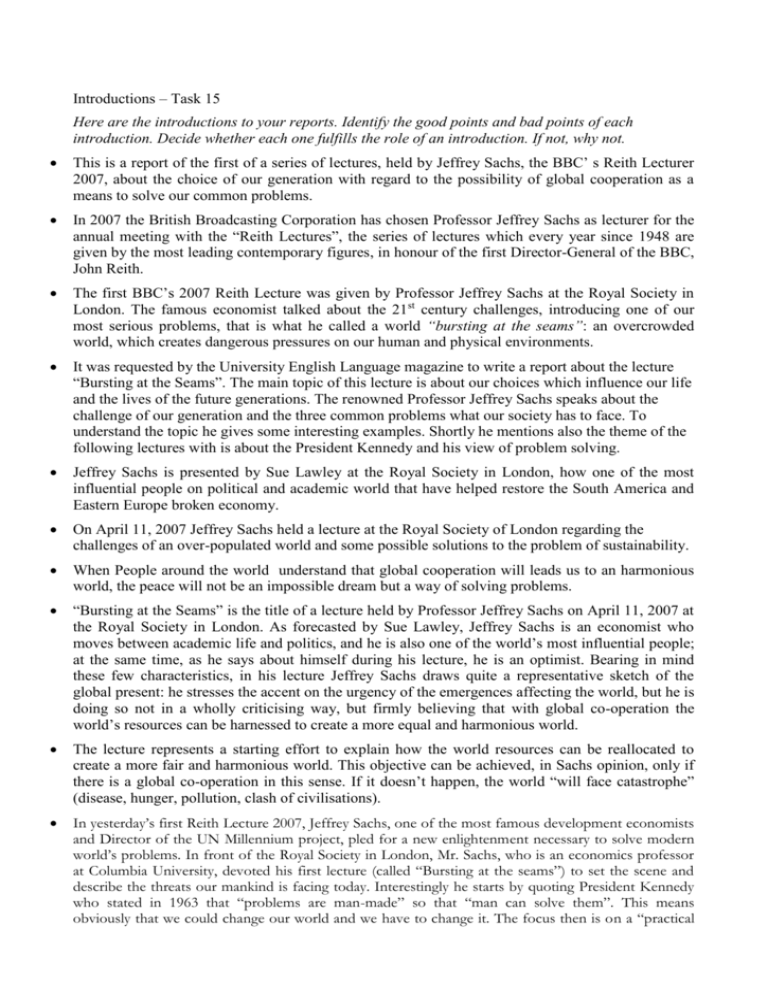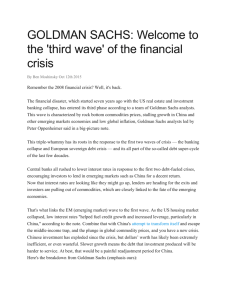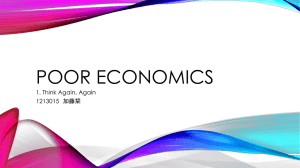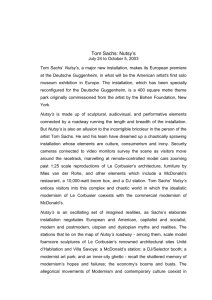Introductions – Task 13
advertisement

Introductions – Task 15 Here are the introductions to your reports. Identify the good points and bad points of each introduction. Decide whether each one fulfills the role of an introduction. If not, why not. This is a report of the first of a series of lectures, held by Jeffrey Sachs, the BBC’ s Reith Lecturer 2007, about the choice of our generation with regard to the possibility of global cooperation as a means to solve our common problems. In 2007 the British Broadcasting Corporation has chosen Professor Jeffrey Sachs as lecturer for the annual meeting with the “Reith Lectures”, the series of lectures which every year since 1948 are given by the most leading contemporary figures, in honour of the first Director-General of the BBC, John Reith. The first BBC’s 2007 Reith Lecture was given by Professor Jeffrey Sachs at the Royal Society in London. The famous economist talked about the 21st century challenges, introducing one of our most serious problems, that is what he called a world “bursting at the seams”: an overcrowded world, which creates dangerous pressures on our human and physical environments. It was requested by the University English Language magazine to write a report about the lecture “Bursting at the Seams”. The main topic of this lecture is about our choices which influence our life and the lives of the future generations. The renowned Professor Jeffrey Sachs speaks about the challenge of our generation and the three common problems what our society has to face. To understand the topic he gives some interesting examples. Shortly he mentions also the theme of the following lectures with is about the President Kennedy and his view of problem solving. Jeffrey Sachs is presented by Sue Lawley at the Royal Society in London, how one of the most influential people on political and academic world that have helped restore the South America and Eastern Europe broken economy. On April 11, 2007 Jeffrey Sachs held a lecture at the Royal Society of London regarding the challenges of an over-populated world and some possible solutions to the problem of sustainability. When People around the world understand that global cooperation will leads us to an harmonious world, the peace will not be an impossible dream but a way of solving problems. “Bursting at the Seams” is the title of a lecture held by Professor Jeffrey Sachs on April 11, 2007 at the Royal Society in London. As forecasted by Sue Lawley, Jeffrey Sachs is an economist who moves between academic life and politics, and he is also one of the world’s most influential people; at the same time, as he says about himself during his lecture, he is an optimist. Bearing in mind these few characteristics, in his lecture Jeffrey Sachs draws quite a representative sketch of the global present: he stresses the accent on the urgency of the emergences affecting the world, but he is doing so not in a wholly criticising way, but firmly believing that with global co-operation the world’s resources can be harnessed to create a more equal and harmonious world. The lecture represents a starting effort to explain how the world resources can be reallocated to create a more fair and harmonious world. This objective can be achieved, in Sachs opinion, only if there is a global co-operation in this sense. If it doesn’t happen, the world “will face catastrophe” (disease, hunger, pollution, clash of civilisations). In yesterday’s first Reith Lecture 2007, Jeffrey Sachs, one of the most famous development economists and Director of the UN Millennium project, pled for a new enlightenment necessary to solve modern world’s problems. In front of the Royal Society in London, Mr. Sachs, who is an economics professor at Columbia University, devoted his first lecture (called “Bursting at the seams”) to set the scene and describe the threats our mankind is facing today. Interestingly he starts by quoting President Kennedy who stated in 1963 that “problems are man-made” so that “man can solve them”. This means obviously that we could change our world and we have to change it. The focus then is on a “practical and obtainable peace”, on “concrete actions” because “peace is a process, a way of solving problems”. However, the scene today is very different from the cold war setting. Professor Jeffrey Sachs, Director of the Earth Institute at Columbia University, opens his speech at the radio programme of the BBC “Reith Lectures”, speaking about our will to move towards a safer world, he says that tihs choiche belong to us, ad it is the foundamental question of our generation. He makes an example quoting the formenr USA president J. F: Kennedy who said that nothing is unsolvable, because problem of our generation (like for example pollution and environmental question) are man-made and so they can be solved by man. On the 10th of March, the Royal Society in London hosted this year’s Reith Lecturer, Professor Jeffrey Sachs, Director of the Earth Institute at Columbia University. Last April, the Royal Society in London had the pleasure to invite Professor Jeffrey Sachs, now director of the Earth Institute at Columbia University, to discuss and try to detect a way for solving many of the world’s problems. Jeffrey Sachs, Director of the Earth Institute at Columbia University, has been hosted by the Royal Society in London for a series of five lectures facing the main topic “The world is Bursting at the Seams”. The lecture delivered by Jeffrey Sachs is an optimist view of the human nature’s faculty to make choices, that will determine our life and the life of the next generations. These choices have to be taken in the direction of global co-operation, this is the right way to resolve differences and to create a more equal world. Professor Jeffrey Sachs is one of the most famous and appreciate studious of economical global issues. In his speech at the Royal Society in London,he had made a very clear report of the true challenge we have to face as a global society: how to live in a overpopulated world,where all of us are connected with the others. According to him,we can't anymore ignore problems that apparently are correlated with other parts of the world. But in doing that,everyone of us has to make a radical shift: we have to stop thinking that in this world we are in a situation of “us versus them (...) us versus Islam, us versus the terrorists, us versus Iran” . Now,the dialogue between nations and political leaders has to be continue,because we are facing the same problems: climate change,food production,water supply,poverty. The Royal society has promoted a series of meeting to discuss scientific issues. The first of five lectures, held by Jeffrey Sachs, a man who had successfully worked in North America to restore broken economies, talks about the devastating changes that overpopulation is creating nowadays. Jeffrey opens his discourse with a J. Kennedy‘s quotation: he said that we don’t have to avoid dream or peace but we have to work to obtain a practical and concrete peace, because this is the only real way of solving problems. This week a very important event took place at the Royal Society in London: the American economist Jeffrey Sachs held the first of a series of brief lectures about global cooperation and the future of our planet. The title of this meeting was “Bursting at the Seams” and it will be followed by four further lectures during the year. Mr Jeffrey Sachs starts his lecture reporting a part of a speech of John Kennedy, made for the Commencement Address at American University in 1963, in which President Kennedy supported the idea that the war isn’t inevitable because the mankind can solve this problem working on it day by day, and starting from today.




